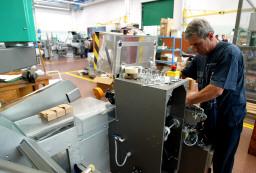Over the next two years some 900,000 jobs could be lost in the industrial, manufacturing and construction sectors, Italy's second-biggest trade union CISL warned on Tuesday.
In its Industry Report 2008, the CISL said that in the past two months there had been a steep increase in the number of enterprises which were in crisis or undergoing major overhauls including such big names as Fiat, Alitalia, Guzzi, Lucchini, Electrolux, Pininfarina, Granarolo, Campari and Unilever.
The union added that whole sector industries were at risk including wool in Prato and Biella, silk in Como, shoe manufacturing in the Marche region, furniture in Puglia and Basilicata and gold-working in Arezzo.
Overall, CISL said that 5% of industrial workers find themselves working for enterprises which are at risk of collapsing and the percentage is ''on the rise''.
Although more open to the government than Italy's biggest, left-leaning CGIL union, the CISL criticised in its report the center-right administration's anti-crisis package for being ''too modest''.
''It is difficult to establish what impact the package will have in the short term because the 80 billion euros involved were already budgeted and just their allocation has been revised,'' CISL said.
If effective measures are not adopted to support consumer spending and the business sector, the CISL warned, ''over the next two years (2009-10) GDP will continue to go down''.
The union said it was convinced that both the Italian government and the European Union needed to take action to combat the crisis and recalled that ''the EU last week expressed a readiness to allow greater flexibility on the parameters established in the euro stability and growth pact'' in regard to budget deficits and public debt.
Any actions taken which increase the deficit or debt, the CGIL stressed, ''must focus on public investment, support salary buying power and benefit employment''.
If this is not the case, the CISL warned, ''the price we pay for the crisis will be among the highest in Europe''.
Aside from acting immediately to help medium and lower-income earners, the union said the government had to ensure financing for small and medium-sized enterprises and embark on a new energy which includes expanding and diversifying the number of primary sources, as well as focusing more on renewable energy.
The government's anti-crisis package, presented last Friday, includes 16.6 billion euros for infrastructures and 2.4 billion euros for low income families.
It also contains measures to ensure liquidity for banks, speed up tax reimbursements and help homeowners finance or refinance their mortgages.
The government also intends to cut red tape to get infrastructures started and will make it more difficult for those opposed to the projects to stop them.
Other measures in the plan included tax breaks for businesses, a crackdown on tax evasion and a freeze on fee hikes for utilities and motorways.
Italy's center-left opposition has branded the package as ''too little, too late'', while the CGIL is going ahead with plans to stage a general strike against the government later this month.









